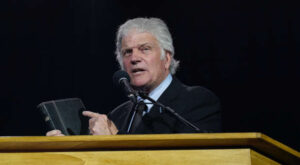In Romans 16:7 Paul says, “Greet Andronicus and Junia, my countrymen and my fellow prisoners, who are of note among the apostles who also were in Christ before me” NKJV). Although the NKJV above has translated the Greek Junian as “Junia,” which is a female name, many today vehemently argue that the name should be “Junias,” which is male.
In fact, I recently received an email in which I was accused of “misleading” people by telling them that “Junia” is the correct reading of this passage and that she was a female apostle. In my response, I sought to be gracious, but shared some of the following information showing why “Junia” is the correct reading, and why she should be given her due recognition by the modern church.
1. The Manuscript Evidence
In this passage, Paul wrote the Greek name Junian, ending with an “n,” because the name is in the accusative sense, or on the receiving end of Paul’s greeting. Because of that ending, the name could be either male (Junias) or female (Junia), depending on how it is accented. Accents, however, were not introduced until the seventh century and so we are left, some think, with a textual conundrum.
The conundrum, however, evaporates in the light of textual and historical evidence. For example, Dr. Bruce Metzger, one of the world’s leading New Testament textual scholars, points out that in and around Rome over 250 Greek and Latin inscriptions have been found with the feminine name “Junia.” The male name, “Junias,” on the other hand, is unattested.
This is significant since Paul’s letter is addressed to the believers who are in Rome; for while the female name “Junia” is common there, the male name, “Junias,” is unknown. “Junias,” therefore, is a hypothetical name invented, it would seem, by those who cannot accept the possibility of a female apostle in the New Testament.
Metzgar also points out that when accents were put in use, the scribes, without exception, made the name feminine. This means that even though the earliest manuscripts of Paul’s letter to the Romans had no accents and so were ambiguous on this point, when accents were added, every extant witness construed the name as feminine. This is why Dr. N. Clayton Croy says, “There is not a single ancient Greek manuscript that accents the name as ‘Junias.’ In effect, then, the interpretation of the name as that of a man is completely lacking in explicit textual support.”
2. The Historical Evidence
Early church fathers, even those who had a bias against women in leadership, understood “Junia” to be a female apostle in the early church. Origin (185-284), who is known as the church’s first systematic theologian, understood the name to be feminine as did the famous church father, Jerome (A.D. 347-420), who produced the Latin Vulgate Bible.
There is also the testimony of John Chrysostom (A.D. 349-407), Bishop of Constantinople, who exclaimed, “O how great is the devotion of this woman, that she should be even counted worthy of the appellation of apostle.” (Hyatt, Paul, Women and Church, 25).
In her excellent book, In the Spirit We’re Equal, Dr. Sue Hyatt points out, “The first known commentator to understand “Junia” as the male name “Junias” was Aegidius of Rome (1245-1346).” She rightly notes that the idea of the name being male is, therefore, a much later development and not worthy of serious consideration.
3. Evidence of Translations
Based, no doubt, on the overwhelming textual and historical evidence, early English translations all opted for the feminine name, “Junia.” These include Tyndale’s New Testament (1526), the Coverdale Bible (1535), the Great Bible (1539), the Geneva Bible (1560), the Bishop’s Bible (1568) and the King James Version (1611).
We only find the male name “Junias” appearing in modern translations beginning with the Revised Version in 1881 and followed by the RSV, the NASB, the TEV, the MSG and the 1984 NIV. Newer translations, such as the NRSV, NLT and NKJV, have returned to the original understanding of the word as “Junia.” Faced with the overwhelming evidence, the translators of the NIV changed the name to “Junia” in their 2011 edition.
The Issue of Authority
The most common reason given by those who oppose recognizing “Junia” as an apostle is that women cannot function in what they would call “the apostolic teaching office.” The problem with this reasoning is it has no basis in Scripture. Neither Jesus, the Twelve or Paul established an “apostolic teaching office.”
Jesus made it clear that His apostles would be characterized not by authority, but by service. This statement came when James and John requested the two most authoritative seats in the kingdom. Jesus rebuked them and told them they were thinking like Gentiles, that is, those who do not know God.
After pointing out how pagan leaders lord it over those under them, Jesus said, “Whoever among you would be greatest must be servant of all. For even the Son of Man came not to be served, but to serve, and to give His life as a ransom for many” (Mark 10:44-45, MEV).
Jesus’ statement must have been shocking to those first apostles, for the word “servant” in this passage is from the Greek word diakonos and referred to a lowly household servant with no status or authority.
Nonetheless, they took His words seriously and diakonos became a common word for Christian leaders in the early church. Paul uses it of himself and his coworkers. We miss the force of the word for early Christianity because our modern translations often render it as “minister.”
John G. Lake, a true modern apostle, got it right when he wrote, “The modern conception of an apostle is usually that he is a big church boss, but that was not the conception Jesus left. An apostle was not to be a big boss; he was to be like his Lord–a servant of all.”
So, during the first century, while apostolic ministry was characterized by service, women freely functioned in apostolic ministry. It was only after the church institutionalized and began to think of the apostolic in terms of authority, office and power that women began to be excluded from leadership and apostolic ministry.
Where We Go From Here
Jesus left His church an authoritative message. He did not leave her an authoritative office or structure. Professor Burnett Streeter was correct when he wrote,
Whatever else is disputable, there is, I submit, one result from which there is no escape. In the primitive church there was no single system of church order laid down by the apostles. During the first hundred years of Christianity, the church was an organism alive and growing—changing its organization to meet changing needs. Uniformity was a later development (Hyatt, Pursuing Power, 43).
We are to contend, not for authority over others, but for the purity of the message that was entrusted to us. This is what Jude was referring to when he wrote, “I found it necessary to write and appeal to you to contend for the faith which was once delivered to the saints” (Jude 3).
In such a setting, there are, I submit, a multitude of modern Junias who will hear the voice of the Holy Spirit prompting them to go forth and proclaim the authoritative message that has been entrusted to them and to the entire body of Christ. {eoa}
This article is derived from Eddie Hyatt‘s books, Paul, Women and Church, and Pursuing Power: How the Historic Quest for Apostolic Authority and Control Has Divided and Damaged the Church. Both are available from Amazon and his website at eddiehyatt.com.
See an error in this article?
To contact us or to submit an article


















